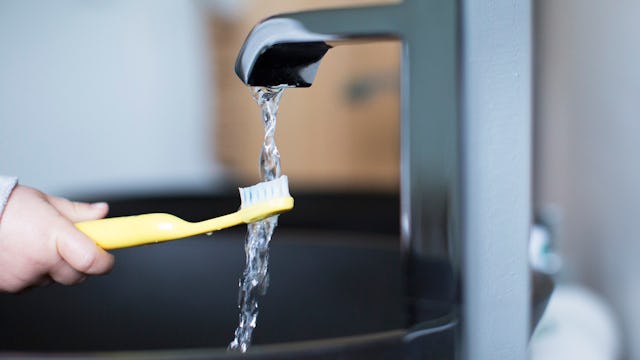CDC Says Kids Are Brushing Their Teeth Wrong, Moms Everywhere Say 'No Sh*t'

The CDC offers new guidelines for kids’ dental hygiene
The Center for Disease Control released a new report regarding kids and dental hygiene. While some parts of the report are, of course, full of important information parents should know — other parts are, well, rather obvious. Like the fact that kids are not so great at brushing their teeth.
The main focus of the report, which came out earlier this week, is that kids are using too much toothpaste. It sounds like it wouldn’t be such a bad thing, but it actually is. They surveyed parents and guardians of more than 5,000 children and found that nearly 40% of kids ages three to six years are using way more toothpaste than necessary.
Turns out kids that age only need a pea-size amount. Children who are younger than three only need a “smear” — which is about the size of a grain of rice. Speaking of children younger than three, the CDC says that there’s no such thing as too young to begin a solid dental hygiene routine once your little one has teeth.
“Brushing children’s teeth is recommended when the first tooth erupts, as early as 6 months, and the first dental visit should occur no later than age 1 year,” the CDC says. Back in the day, recommendations were a lot different — but it’s incredibly important that you start taking care of your child’s teeth as soon as they get their first one.
The CDC also says parents need to be cognizant of flouride — one of the “main factors responsible for the decline in prevalence and severity of dental caries and cavities in the United States.” They recommend all persons drink optimally flouridated water (which works out to be about 0.7mg per liter). Children younger than two years old should brush their teeth twice daily with a flouride toothpaste to reduce the risk of cavities.
It’s important to know that while flouride has many benefits, like preventing cavities, ingesting too much flouride while teeth are developing can result in “visibly detectable changes in enamel structure, such as discoloration.”
All in all, it’s…a lot to remember. And I don’t know about you, but my three-year-old is very much into the “I do it BY MYSELF” phase, and that carries over to brushing her teeth. I only let her “do it” after I’ve done a satisfactory job myself first, but still — you want your kids to be independent and have a hand in their own hygiene as they grow older and more capable. But leaving their entire dental hygiene routine completely up to them before age six is, uh, apparently not a good idea.
Personally, my school of thought on matters like these is “if they can’t be trusted to wipe their butts thoroughly and completely, every time, every day, then they probably need help with other hygienic tasks as well. And that’s okay!
And, as always, if you ever have questions or concerns about this sort of thing, your dentist is the perfect person to ask.